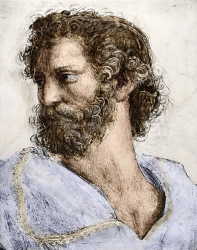  Aristotle, born in 384 BC in Greece, was a philosopher and scientist, and one of the greatest minds in history. He was the author of both philosophical and scientific systems that became the foundation of most of Western thinking for over two thousand years. Even after the intellectual upheavals of the Renaissance, Aristote's influence on philosophy and the sciences remained profound.
Aristotle, born in 384 BC in Greece, was a philosopher and scientist, and one of the greatest minds in history. He was the author of both philosophical and scientific systems that became the foundation of most of Western thinking for over two thousand years. Even after the intellectual upheavals of the Renaissance, Aristote's influence on philosophy and the sciences remained profound. Aristotle's range of interests was vast, covering most of the sciences and many of the arts, including biology, botany, chemistry, ethics, logic, metaphysics, rhetoric, philosophy, physics, political theory, psychology, and zoology. He was the originator of formal logic, and he was the first to systematically study zoology, where some of his work remained unequaled until the 19th century. But Aristotle is most well known as a philosopher. His writings in ethics and political theory, as well as in metaphysics and the philosophy of science, continue to be studied, and his work remains a powerful component of philosophical debate. Almost all of Aristotle's writings continue to be studied in colleges today, not only for historical reasons, but as the foundations in many fields. Aristotle carried out extensive scientific research, particularly in zoology and marine biology. Although Aristotle did not claim to have founded the science of zoology, his detailed observations of a wide variety of living things were groundbreaking. Some of the features of insects that he accurately described were, amazingly, not again observed until the invention of the microscope in the 17th century. The scope of Aristotle’s scientific research is incredible. He worked on the classification of animals into genus and species; more than 500 species were described, many in great detail. He studied their anatomy, diet and habitat. He wrote about the reproductive systems of mammals, reptiles, fish, and insects. Some of his descriptions of rare species of fish were not corroborated for many centuries; he also posed questions that took millennia to solve, such as the nature of an embryo's development. Aristotle’s biological studies were a remarkable achievement. His inquiries were conducted in a genuinely scientific spirit, and he was always ready to proclaim ignorance when evidence was insufficient. He maintained that whenever there is a conflict between theory and observation, one must trust observation, and theories are to be trusted only if their results match observed phenomena. Aristotle divided the theoretical sciences into three groups: physics, mathematics, and theology. Physics was equivalent to what would now be called 'natural philosophy', or the study of nature, which encompasses not only physics but also biology, chemistry, geology, psychology, and even meteorology. While Aristotle’s contributions to the physical sciences are less impressive than his researches in the life sciences, his ideas were the starting points for many disciplines, even if they turned out to be in error. For example, he adopted the view that the universe is composed of different combinations of the four fundamental elements: earth, water, air, and fire. Aristotle’s surviving works amount to about one million words, though they probably represent only about one-fifth of his total output. He died in 322 B.C., having contributed more to Western knowledge than any other individual ever had before, or has had since. |